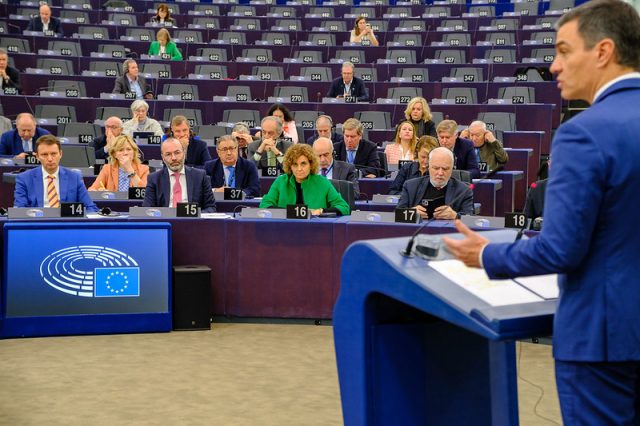
It has been a month since the Spanish presidency of the Council of the EU ended. The tumultuous presidency was marred by an unforeseen snap election and shameful negotiations with Catalonian separatists.
The Pedro Sánchez-led six-month rotating presidency left will little tangible results for the European project. What it did leave was a propagandistic line of attack against European Conservatives that is setting the tone for political debate not only in Spain, but in other Member States.
In mid-December, the European Parliament witnessed some tense scenes during the parliamentary debate where Sánchez, in theory, was supposed to present before MEPs the achievements of Spain’s Presidency. However, Sánchez instead chose to scold Europe’s conservatives and lock horns with EPP President Manfred Weber, breaking with the Council Presidency’s intended neutral, consensual and bridge-building institutional role.
Despite the consensus-building that the Presidency of the Council is supposed to be characterised by, during the debate, Sánchez employed the same divisive, polarising rhetoric that he uses in Spain, demonising his political opponents and presenting his ideology as the sole moral high ground.
Sánchez was referring to Weber’s efforts to build bridges with the conservative ECR group with his eyes set on the 2024 European Parliament elections, seeking to build new alliances in the to find an alternative governing coalition to the traditional coalition between the EPP, liberals and socialists in the European Parliament. Of course, Prime Minister Sánchez has an issue with so-called “far-right” parties’ stances on defending national sovereignty, opposing mass immigration, or defending the European primary sector and industry. Sánchez, however, has proven time and again that he has no moral qualms with polarising societies and striking deals with communist and separatist parties to stay in power.
His decision to take aim at Weber with such unparliamentary language was very much premeditated, for two fundamental reasons: firstly, what Weber represents to Sánchez, and secondly, the electoral context. Regarding the first, Weber has been very critical of Spain’s authoritarian turn under Sánchez’s premiership. During the parliamentary debate, he highlighted that the EU is “worried” and “asking serious questions” about the deal between Sánchez and Junts granting amnesty to the leaders of the failed 2017 putsch in return for Sánchez staying in power.
The second reason for Sánchez’s hostility was the looming elections to the European Parliament that will be held in June 2024. Essentially, by going on the offensive against the conservative bloc, Sánchez has seeking to close ranks on the socialist side. The European socialists have been going through a rough time, with scandals such as Qatargate, unfavourable poll ratings, and only in control of few prominent Member State governments (Spain and Germany). Therefore, Sánchez’s rhetoric was intended for the socialists to dig in and launch a campaign mode offensive against the conservative bloc, even if this action violated Sánchez’s institutional role during the closure of the Spanish Presidency.



 Subscribe
Subscribe